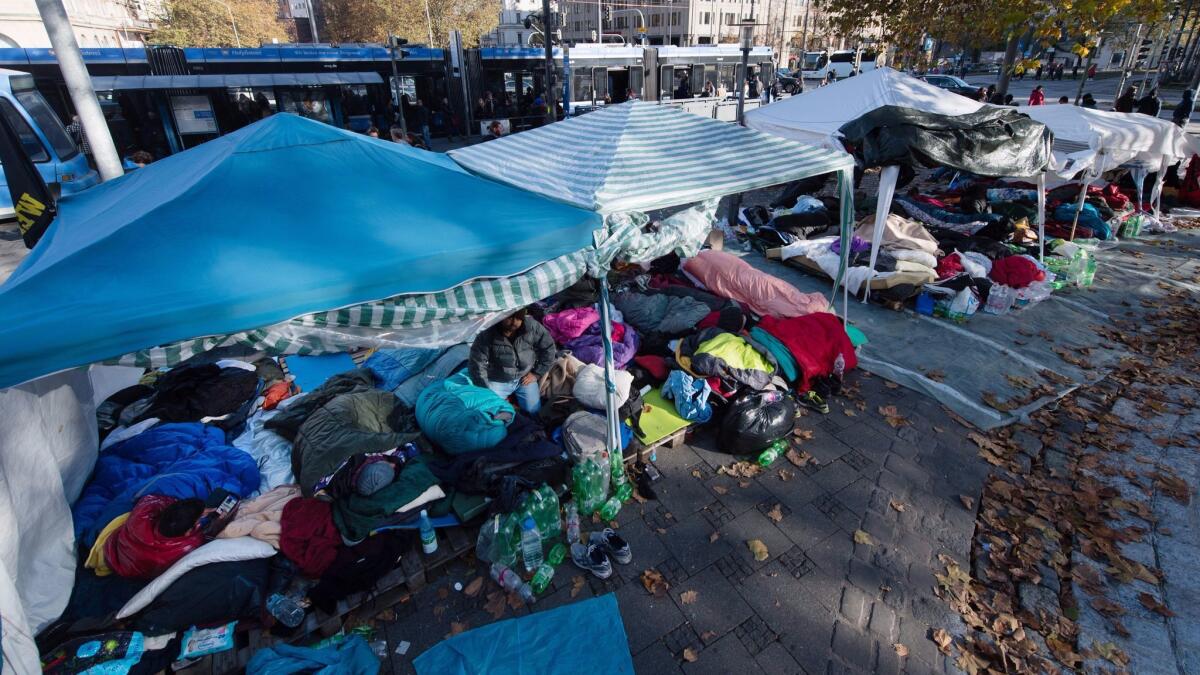German officials look to keep migrants from crossing the Mediterranean Sea to apply for asylum in Europe

- Share via
Reporting from Berlin — Germany’s Interior Ministry appears willing to change the country’s open-door policy toward migrants in favor of seeing refugee boats intercepted at sea and returned to northern Africa.
The Interior Ministry said Monday it wants to discourage migrants from making the dangerous journey across the Mediterranean Sea and to encourage people to apply for European Union asylum from northern African countries.
Thousands of people relying on smugglers have perished this year trying to cross the Mediterranean to reach Europe. Many others have been rescued from wretched conditions in overcrowded or non-seaworthy boats and given shelter in nearby Italy or Greece before heading north to Germany or elsewhere.
Officials say Germany has taken in more than 1 million refugees fleeing war and poverty in the Middle East, Asia and Africa during the past 15 months, more than the rest of the 28-nation EU combined.
“The goal has to be to stop the smugglers and protect migrants from risking their lives by attempting to cross the Mediterranean Sea,” the ministry, led by Thomas de Maiziere, a close ally of Chancellor Angela Merkel, said in a statement. “Take away the prospect of reaching the shores of Europe and that could lead migrants to refrain from risking their lives and spending an enormous amount of money on smugglers.”
The International Organization for Migration said Friday that 4,220 migrants and refugees had died so far this year trying to cross the Mediterranean, already making 2016 the deadliest year recorded. In 2015, the number killed was 3,770, the organization said.
The Geneva-based organization also said about 335,000 migrants and refugees had entered Europe by sea this year, arriving mostly in Greece and Italy, through early November, far fewer than the nearly 729,000 arrivals at a similar point last year.
The conservative-led German government hopes that the numbers of those attempting to cross the Mediterranean would be greatly reduced within days of a new policy being introduced. They point to Australia’s policies — which call for migrants intercepted at sea to apply for asylum via camps outside Australia — as an example for the EU to follow, an idea proposed in June by Austria’s foreign minister Sebastian Kurz. The EU Commission rejected the idea at the time.
The EU has said it did not want to adopt such policies. It is unclear whether a change of heart in Germany, the bloc’s largest country, may lead to a shift within the union.
Some political scientists and opposition political leaders in Germany expressed doubts that any new hurdles to the prospect of getting asylum in Europe would deter many people, and said changes could instead lead to further tensions in already-unstable countries on the rim of the Mediterranean Sea.
The Interior Ministry statement marks an about-face for Merkel’s open-door policies on refugees. She has suffered a string of state election defeats in the last year as attitudes in Germany have cooled perceptibly following an initial wave of widespread support for refugees.
“It’s a new policy direction for Germany but it’s not going to work,” said Thomas Jaeger, a political scientist at Cologne University, in a phone interview Monday.
“The German government hopes to set up refugee centers in countries around the Mediterranean. But as it is now, there are hardly any stable countries in the region,” Jaeger said. “This could just exacerbate tensions and lead to even more smuggling and human rights abuse. It’s not a good idea and it’s not going to work.”
Katrin Goering-Eckardt, a leader in parliament of the opposition Greens party, dismissed the idea.
“The Interior Ministry wants to treat refugees as if they have a contagious illness,” Goering-Eckardt said in a radio interview, adding that the Constitution ensures protection for refugees. “It’s more than legally dubious, let alone being dubious from a humanitarian point of view, for them to try to deny refugees their right for fair treatment.”
The center-left Social Democrats, Merkel’s coalition partners in Berlin, reacted with caution. Ralf Stegner, a party leader, said the group wants to stop smugglers from putting refugees in danger in the pursuit of profits.
“But we won’t support anything that violates humanitarian principles,” he said. “Rescuing people in distress at sea so they don’t drown will remain our humanitarian obligation.”
Kirschbaum is a special correspondent.
More to Read
Sign up for Essential California
The most important California stories and recommendations in your inbox every morning.
You may occasionally receive promotional content from the Los Angeles Times.










